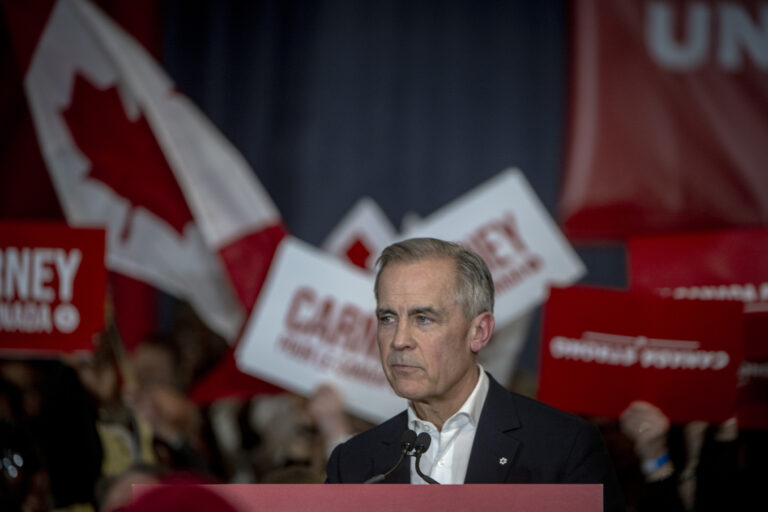Most heads of state have treaded carefully around President Donald Trump since he returned to power, but Canada’s new Prime Minister Mark Carney has taken a more aggressive approach — and there are indications that it may be working, at least for now.
Trump said on social media Friday that he had an “extremely productive” conversation with Carney earlier in the day, after the two leaders spoke for the first time since Carney won a race to lead the Canada’s Liberal Party. He was sworn in as prime minister earlier this month.
Carney called for new elections in April and is now leading in polls over Conservative Party leader Pierre Poilievre — a remarkable turnaround for the Liberals, who appeared moribund under the leadership of former Prime Minister Justin Trudeau and on the path toward an electoral blowout before Trump was inaugurated and began antagonizing the northern neighbor.
Trump said he planned to meet with Carney after the election, a sign he may be seeking to establish a better relationship with Carney than his predecessor.
“It was an extremely productive call, we agree on many things, and will be meeting immediately after Canada’s upcoming Election to work on elements of Politics, Business, and all other factors,” Trump said. He said the working relationship would “end up being great for both the United States of America and Canada.”
Carney’s office said after the call that the two leaders had “agreed to begin comprehensive negotiations about a new economic and security relationship immediately following the election.”

Photo by Andrej Ivanov/Getty Images
The positive statements suggested a departure from the volatility that defined the relationship between Trump and Trudeau, as well as other Canadian leaders who’ve pushed back against the White House since Trump launched a trade war with Canada shortly after taking office in January.
Trump’s warm tone was all the more striking given Carney’s willingness to criticize the United States more harshly than most other foreign leaders.
With some notable exceptions — such as the Oval Office shouting match between Trump and Ukrainian President Volodymyr Zelensky — many foreign leaders have steered clear of public confrontations with Trump in order to avoid angering a powerful ally and becoming the target of new tariffs.
But Carney’s situation is different due to his domestic political concerns and the pressure he faces to stand up to Trump’s regular calls for Canada to become America’s 51st state, said Vivek Astvansh, an expert on U.S.-Canada relations at McGill University in Montreal.
“Unlike other leaders, Carney is in a unique position. He’s only been prime minister for a few weeks and has called for an election in 30 days,” Astvansh said. “It’s imperative for Carney to appear [to Canadian voters] that he will not suck up to Donald Trump.”
Carney gave an unusually blunt assessment of the relations between the U.S. and Canada on Thursday after Trump announced a new 25 percent tariff on auto imports. Trump argued the move would boost domestic manufacturing. Experts warned it would hurt the American auto industry, raise prices on U.S. consumers and escalate the trade war with Canada, Mexico and other major U.S. trading partners.

Anna Moneymaker/Getty Images
“It is clear that the United States is no longer a reliable partner,” Carney said Thursday, before the call. “It is possible that, with comprehensive negotiations, we will be able to restore some trust, but there will be no turning back.” Carney also vowed to “fight the U.S. tariffs with retaliatory trade actions of our own.” His office’s statement after the phone call with Trump also mentioned that retaliatory tariffs would be implemented if the promised U.S. tariffs went into effect on April 2, as expected.
Trump did not mention tariffs in his social media post summarizing the call with Carney. The White House did not immediately release an official readout, or summary, of the call.
Trump also didn’t mention his frequent calls since taking office for Canada to get absorbed into the U.S. Before stepping down as prime minister, Trudeau said that Canada would never allow that to happen.
Since replacing Trudeau, Carney has also pushed back aggressively against the notion that Canada might somehow get annexed to the United States. Carney said last week that his country would negotiate tariff policies with the U.S. once Canada is “shown respect” as a sovereign nation.
Canada’s elections for prime minister are set for April 28, just weeks after the new tariffs are set to be implemented.


